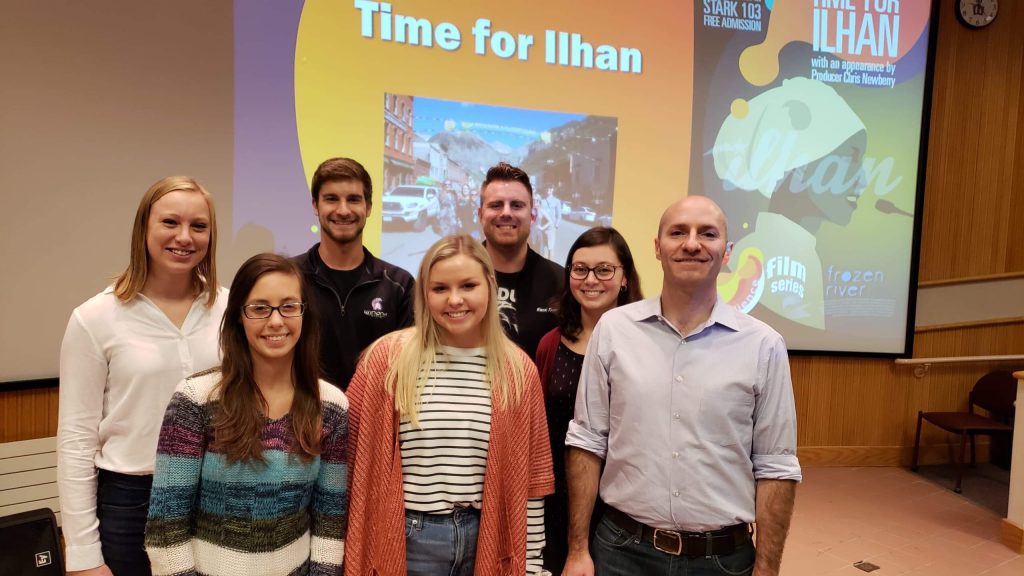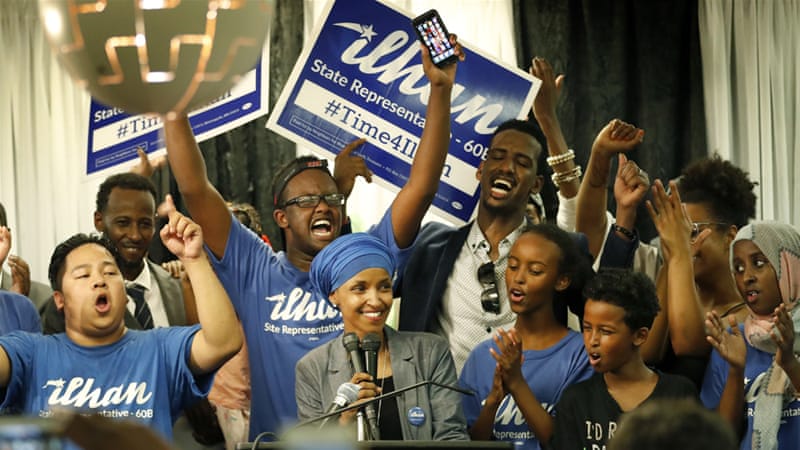The fourth film to screen at the Resilience Film Series at WSU was Time For Ilhan, a captivating documentary about Ilhan Omar, the first Somali Muslim woman to be elected to political office in America. The film is directed by Norah Shapiro, a local Minneapolis filmmaker, and produced and shot by Chris Newberry. The film fits well with our Resilience theme, portraying Ilhan overcoming not only different racial and gendered stereotypes but also the accusations made about her throughout the campaign. Her desire to be heard and to make a change within her community is captivating and inspiring to all.

WSU Film Studies students with the director of Frozen River Film Festival, Sara Enzenauer, and Time for Ilhan producer/cinematographer, Chris Newberry.
The film is shot in a verité style common to documentaries. In Time For Ilhan, this technique is extremely effective in that it portrays the events as they unravel in a fly-on-the-wall manner, capturing the raw emotion and the reactions as all the action is happening that very moment. We were lucky to have the film’s producer and director of cinematography, Chris Newberry, on hand for a discussion of the film. He said this technique can be both incredibly insightful and utterly unpredictable. Obviously, the Time for Ilhan crew didn’t know how the election was going to turn out nor how the message of the film would be received.

IlhanOmar after winning her election, with Chris Newberry filming in the background.
One thing that they did have complete control over during the production was the editing. Editing these types of documentaries takes precision and patience. Newberry said that once the crew was finished gathering footage, they had endless hours’ worth of film that they would have to edit through. This is where the process can get sticky. So let’s say that Ilhan did not win the election: now the motif of the film can’t be to inspire people to break through the glass ceiling and motivate women and monitories; instead the film would be more about overcoming adversity and not giving up on your dreams–even if you fail.
The cinematography and editing help to tell the narrative, but it is truly the protagonist’s resilience that wins the affection of her electorate and the film’s audience. Ilhan Omar is a woman, she is young, and she is Somalian. She must push the boundaries of her culture while empowering other women across the country to have a voice of their own and to use it.
The competition in the film is between Omar and Phyllis Kahn, the lontime representative for the district, and Muhammad Noor, a Somalian man who has ran in previous years. The film indirectly focuses on the struggle being a political figure and the fierce competition that each candidate can be. There are several moments where Omar expresses how exhausted she is and struggling to go door to door and person to person. There are portions of the film where Kahn condescends and is arrogant to Omar. Later in the film, as Newberry explained to use, when Omar and Noor had a heated conversation at the caucus, the filmmakers did not understand the conversation at the time but filmed anyways, in the process having access to a key moment showing the audience the height of the conflict between the two candidates.

Omar and her team at 2016 caucus
Omar even remains resilient after she wins the primary and a nasty rumor about her committing immigration fraud appears. Then-candidate Donald Trump’s hateful words about Somali-Americans–expressed on national television–insulted Omar as well. But Omar remains resilient and focused on what she can control. She continues to move forward and challenge the standards, and now she is currently running for the U.S. congress and continuing to fight for those who can’t. Omar is one of the most influential and resilient women not only in Minnesota, but in all of America, making her voice heard and her fight visible, one day at time.

Omar is currently a candidate for U.S. House of Representatives.

Recent Comments